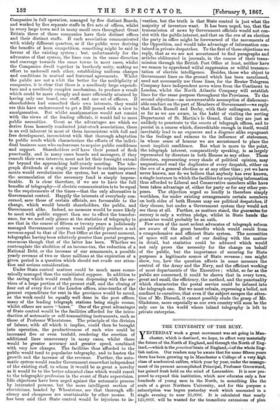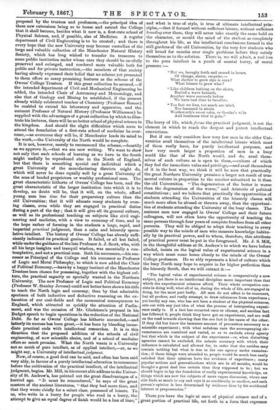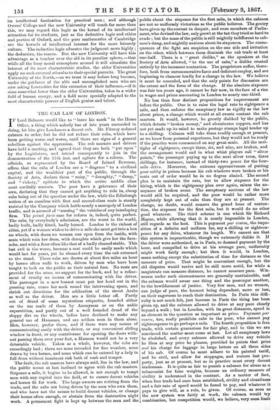THE UNIVERSITY OF THE BUSY.
VESTERDAY week a great movement was set going in Man- i_ cheater, which is destined, we hope, to affect very materially the future of the North of England, and through the North of Eng- land,—which is the practical brain of England,.-:.of the whole Eng- lish nation. Our readers may be aware that for some fifteen years there has been growing up in Manchester a College of a very high class of academical calibre, which year by year, under the manage- ment of its present accomplished Principal, Professor Greenwood, has gained fresh hold on the mind of Lancashire. It is now pro- posed to expand this institution, which now educates only a few hundreds of young men in the North, to something like the scale of a great Northern University, and for this purpose a subscription was begun yesterday week which amounted in a single evening to near 25,0001. It is calculated that nearly 125,000/. will be wanted for the immediate extensions of plan
proposed by the trustees and professors,—the principal idea of these new extensions being so to house and extend the College that it shall become, besides what it now is, a first-rate school of Physical Science, and, if possible, also of Medicine. A regular department of Civil Engineering is to be created ; and there is every hope that the new University may become custodian of the large and valuable collection of the Manchester Natural History Society, which has long wished to transfer its treasures to some public institution under whose care they should be carefully preserved and enlarged, and rendered more valuable both for public and for private instruction,—the members of that society having already expressed their belief that no scheme yet presented to them offers so many promising features as the scheme of the Owens' College Trustees. If this great collection be secured,—if the intended department of Civil and Mechanical Engineering be added, the intended Chair of Astronomy and Meteorology, and also that of Geology and Mining be established, if the present already widely celebrated teacher of Chemistry (Professor Roscoe) be enabled to extend his laboratory and apparatus, and the eminent Professor of Natural History (Professor Williamson) be supplied with the advantages of a great collection by which to illus- trate his lectures, there will be no better school of physical science in the kingdom. And should the slight difficulties which seem to attend the foundation of a first-rate school of medicine be over- come,—as overcome they will be, if Manchester lends its mind to the work,—the University of the North would be complete.
It is not, however, merely to recommend the scheme,—heartily as we approve it,—that we are now writing. We want to show not only that such schools of learning as we have in the South might usefully be reproduced also in the North of England, but that there is something special and individual which a great University of the manufacturing districts might do, which will never be done equally well by a great University of the sons of landed proprietors or wealthy professional men. The great characteristic hitherto of Owens' College has been, and the great characteristic of the larger institution into which it is to develop, no doubt will be, that it will, on the whole, afford young men leas time for their preparatory culture than the old Universities; that it will educate many students by even- ing classes, even while they are engaged in practical duties during a part of the day ; that it will give all its general culture, as well as its professional teaching on subjects like civil engi- neering and medicine, with a view to economy of time, and in the hope rather of forming in the students a large, rapid, and
• impartial practical judgment, than a calm and leisurely specu- lative intellect. The history of Owens' College has already suffi- ciently indicated its practical genius. It failed, or all but failed, while under the guidance of the late Professor A. J. Scott, who, with all his large insights and tranquil wisdom, was essentially a con- templative, and not a practical man. Both his successors,—his suc- cessor as Principal of the College and his successor as Professor of Logic and Moral Philosophy, to which is now added the Chair of Political Economy,—have by a happy instinct of the Manchester Trustees been chosen for possessing, together with the highest cul- ture, the practical sagacity so specially wanted in the Northern University. The new Professor of Logic and Political Economy (Professor W. Stanley Jevons) could not better have shown his title to teach the North logic and economy, than by that admirable specimen of both inductive and deductive reasoning on the ex- haustion of our coal-fields and the economical consequences to England, which attracted so quickly the attention of Parlia- ment, and was the occasion of Mr. Gladstone's proposal in his Budget speech to begin operations in the reduction of the National Debt. So far as Owens' College has hitherto succeeded,—and latterly its success has been great,—it has been by blending imme- diate practical ends with intellectual researches. It is in this direction that the proposed addition of the schools of civil engineering, of new scientific chairs, and of a school of medicine offers so much promise. What the North wants is a University not so much of pure intellect, as of applied intellect,—or, as we might say, a University of intellectual judgment.
Now, of course, a good deal can be said, and often has been said very ably, in favour of a purely intellectual education to commence before the cultivation of the practical intellect, of the intellectual judgment, begins. Mr. Mill, in his recent able address to the Univer- sity of St. Andrew's, has pointed out the great disadvantages of a hurried age. "It must be remembered," he says of the great masters of the ancient literatures, "that they had more time, and that they wrote chiefly for a select class, possessed of leisure. To us, who write in a hurry for people who read in a hurry, the attempt to give an equal degree of finish would be a loss of time," and what is true of style, is true of ultimate intellectual prin- ciples,—that if formed without sufficient leisure, without sufficient brooding over them, they will never take exactly the same hold on the character, or mould the mind of the student as completely throughout his life, as the intellectual conclusions formed in the still gardens of the old Universities, by the very few students who will brood for months over single problems before they satisfy themselves as to the solution. Thera is, we will admit, a real loss to the pure intellect in a youth of mental hurry, of moral pressure :—
"But we, brought forth and reared in hours,
Of change, alarm, surprise,— What shelter to grow ripe is ours ? What leisure to grow wise ?
"Like children bathing on the shore, Buried a wave beneath, Another wave succeeds before We have had time to breathe ; "Too fast we live, too much arc tried, Too harassed to attain Wordsworth's sweet calm, or Goothe's wide And luminous view to gain."
The hurry of life, which forms the practical judgment, is not the- element in which to reach the deeNst and purest intellectual convictions.
But if one only considers how very few men in the older Uni- versities avail themselves of the intellectual leisure which most of them really have, for purely intellectual purposes, and how very much larger a proportion of men in a busy world like that of the North would, and do, avail them- selves of such culture as is open to them,—culture of which they feel the immediate value and privilege,—and avail themselves of it in the best way, we think it will be seen that practically the great Northern University promises a larger net result of true mental culture in proportion to the number submitted to it than the old Universities. "The degeneration of the better is worse than the degeneration of the worse," said Aristotle of political constitutions ; and we believe that practically the opportunities of students attending the Universities of the leisurely classes will much more often be abused or thrown away, than the opportuni- ties of students attending the University of the busy classes. The eminent men now engaged in Owens' College and their fixture colleagues, will not often have the opportunity of teaching the same persons through four years of complete freedom from all other pursuits. They will be obliged to adapt their teaching in every possible way to the minds of men who measure knowledge habitu- ally by its practical power, and to whom, therefore, this attribute- of practical power must be put in the foreground. Mr. J. S. Mill, in the thoughtful address at St. Andrew's to which we have before- alluded, insists on the logical value of experimental science in a way which must come home closely to the minds of the Owens' College professors. He so ably represents a kind of culture which the busy North may hope to acquire in far higher perfection than the leisurely South, that we will extract it :—
" The logical value of experimental science is comparatively a new subject, yet there is no intellectual discipline more important than that which the experimental sciences afford. Their whole occupation con- sists in doing well, what all of us, during the whole of life, are engaged in doing, for the most part badly. All men do not affect to be resaoners, but all profess, and really attempts to draw inferences from experience yet hardly any one, who has not been a student of the physical sciences, sets out with any just idea of what the process of interpreting experi- ence really is. If a fact has occurred once or oftener, and another fast has followed it, people think they have got an experiment, and are well on the road towards showing that the one fact is the cause of the other. Ifthey did but know the immense amount of precaution necessary to a scientific experiment ; with what sedulous care the accompanying cir- cumstances are contrived and varied, so as to exclude every agency but that which is the subject of the experiment—or, when disturbing agencies cannot be excluded, the minute accuracy with which their influence is calculated and allowed for, in order that the residue may contain nothing bat what is due to the one agency under examina- tion ; if these things were attended to, people would be much less easily satisfied that their opinions have the evidence of experience ; many popular notions and generalizations which are in all mouths, would be thought a great deal less certain than they supposed to be ; but we
should begin to lay the foundation of really experimental knowledge, on things which are now the subjects of mere vague discussion, where one side finds as much to say and says it as confidently as another, and each person's opinion is less determined by evidence than by his accidental interest or prepossession."
There you have the logic at once of physical science and of a great portion of practical life, set forth in a form that expresses its intellectual fascination for practical men ; and although Owens' College and the new University will teach far more than this, we may regard this logic as the kernel of its intellectual attraction for its students, just as the deductive logic and ethics and poetics of Oxford, and the pure mathematics of Cambridge are the kernels of intellectual interest for the more leisurely culture. The inductive logic educates the judgment more highly ; the deductive, the reason. But the new University will have this advantage as a teacher over the old in its peculiar sphere, —that while all the busy moral atmosphere around it will stimulate the interest of its most characteristic studies, the older Universities apply no such external stimulus to their special pursuits. The great University of the North,—as we trust it may before long become, under the guidance of the able and accomplished men who are now asking Lancashire for this extension of their infinence,—if it aims somewhat lower than the older Universities, takes in a wider field of human energy, and a field more specially adapted to the most characteristic powers of English genius and talent.
































 Previous page
Previous page